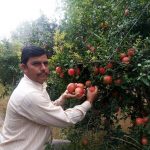Meet Rajasthan’s Jojoba Farmer Who Hold Hotel Management Degree from IHM Pusa Delhi, But He Chose to Follow His Father’s Footsteps
Farming has never been and never will be an easy life, but for many people who don’t have any option for them farming is the only choice. That’s why today most of the farmers send their kids to school and college so that they can choose whatever they want and become whatever they want. But one such person who even had a good job opportunity, but then also he chose to farm is Hind Pal Singh Aulakh.
Hind Pal Singh was born in a typical farming family of Rajasthan (Ganganagar District), but was grown up in a very different modern environment; with the motive of pursuing different profession than his father, he pursued Bachelors in Hotel Management from IHM PUSA, Delhi.
“But maybe Hind Pal Singh wasn’t destined to continue his career in the same field. His father was a farmer and was very much interested in farming. His father inspired and motivated him to start farming.”
After seeing so much passion of his father towards farming, he decided to help him. He also started reading agriculture related magazines like Changi Kehti etc. In one of the magazines, he read about Jojoba Farming and thought of giving it a try. He visited Jaipur and took training from there in Jojoba Farming. Mr. Saini was a faculty member of the training staff who helped and guided him in jojoba farming and especially visited his farm in his hometown also.
In the beginning, Hind Pal Singh was a little scared before starting Jojoba Farming, but now it’s been 12 years since he is doing jojoba farming and he is very happy with the yield and returns. He bought the Jojoba seedlings from Rajasthan Agriculture University because jojoba plants need to be planted in 10:1 ratio, where 10 is for female jojoba plants and 1 is for male jojoba plant. And only a proper agriculture university or expert can help in providing the right jojoba plants because common people cannot identify the male and female plants in seedling until they start flowering (can take up to three years).
“The female plants produce seed from flowers pollinated by the male plants, female plant is dependent on male plants for seed production.”
Planting and farming jojoba was not that easy for Hind Pal Singh. He faced many problems like termite and fungus, but he dealt with it very smartly. He always consulted an expert and used micro food and basic fertilizers for farming. From the year of the plantation, it starts bearing fruits in 6th and 7th year.
“One Time Investment: Jojoba farming is the best thing to do in an area like Rajasthan where there is water scarcity because it needs very less water for irrigation (can survive without water for two years), moreover the plant age is up to 100 years.”
In the beginning inter-cropping can also be done when the jojoba plants are small because they don’t start bearing seeds properly up to 6th to 7th years. He faced few difficulties in marketing the produce, but he took no help from the government. As Cosmetics Company need jojoba seeds in for making face cream, oil, face wash and many more beauty products, so soon he found his consumer and started earning good profit.
“Jojoba Oil also has an alternate use as a fuel oil because of its viscosity index. It can be used as transformer oil or as a lubricant for high-speed machinery or machines operating at high temperature.”
Other than jojoba farming which he is doing in approx. 5 acres, he is also growing cotton, wheat, seasonal veggies, mustard, kinnow and other crops in the rest 65 acres of land. He implements all the modern farming machinery like tractor, trolley, cultivator, leveller, disc harrow and drip irrigation system for better farming. His future plan is to expand what he is doing right now and attract more loyal and profitable consumers of jojoba seeds. With a minor 45 thousand of investment today he is earning in lakhs. Moreover, jojoba is a disease free and fire resistant plant which needs very less care once the plant is fully grown.
Message to Farmers
“Farmers have to become independent and start thinking differently if they want to earn profit from farming. One more thing that farmers have to do is to keep track of their accounts and give their hundred percent if they have started something.”








